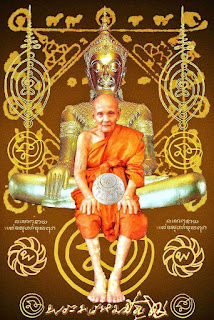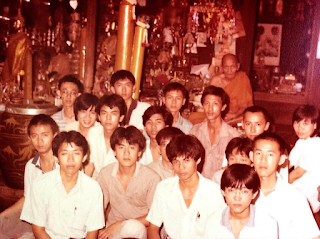DHAJAGGA SUTTA.
Yassānussaraṇenāpi,
antalikkhepi pāṇino;
Patiṭṭhamadhigacchanti,
bhūmiyaṃ viya sabbathā.
Sabbupaddavajālamhā,
yakkhacorā disambhavā;
Gaṇanā na ca muttānaṃ,
parittaṃ taṃ bhaṇāma he.
Evaṃ me sutaṃ:
ekaṃ samayaṃ Bhagavā Sāvatthiyaṃ viharati
Jetavane Anāthapiṇḍikassa ārāme.
Tatra kho Bhagavā bhikkhu āmantesi “Bhikkhavo” ti.
“Bhadante” ti te bhikkhū Bhagavato paccassosuṃ.
Bhagavā etadavoca:
Bhūtapubbaṃ bhikkhave devāsura saṅgāmo samupabyūḷho ahosi.
Atha kho bhikkhave Sakko devānamindo deve Tāvatiṃse āmantesi,
“Sace mārisā devānaṃ saṅgāmagatānaṃ uppajjeyya bhayaṃ vā
chambhitattaṃ vā lomahaṃso vā mameva tasmiṃ samaye
dhajaggaṃ ullokeyyātha;
mamaṃ hi vo dhajaggaṃ ullokayataṃ yaṃ bhavissati bhayaṃ vā
chambhitattaṃ vā lomahaṃso vā, so pahīyissati.
No ce me dhajaggaṃ ullokeyyātha,
atha Pajāpatissa devarājassa dhajaggaṃ ollokeyyātha.
Pajāpatissa hi vo devarājassa
dhajaggaṃ ullokayataṃ
yaṃ bhavissati bhayaṃ vā chambhitattaṃ vā,
lomahaṃso vā, so pahīyissati.
No ce Pajāpatissa devarājassa dhajaggaṃ ullokeyyātha,
atha Varuṇassa devarājassa dhajaggaṃ ullokeyyātha;
Varuṇassa hi vo devarājassa dhajaggaṃ ullokayataṃ
yaṃ bhavissati bhayaṃ vā chambhitattaṃ vā
lomahaṃso vā, so pahīyissati.
No ce Varuṇassa devarājassa dhajaggaṃ ullokeyyātha
atha Īsānassa devarājassa dhajaggaṃ ullokeyyātha;
Īsānassa hi vo devarājassa dhajaggaṃ ullokayataṃ
yaṃ bhavissati bhayaṃ vā chambhitattaṃ vā
lomahaṃso vā, so pahīyissati.
Taṃ kho pana bhikkhave Sakkassa vā devānamindassa
dhajaggaṃ ullokayataṃ, Pajāpatissa vā devarājassa dhajaggaṃ
ullokayataṃ, Varuṇassa vā devarājassa dhajaggaṃ ullokayataṃ,
Īsānassa vā devarājassa dhajaggaṃ ullokayataṃ,
yaṃ bhavissati bhayaṃ vā chambhitattaṃ vā lomahaṃso vā,
so pahīyethāpi nopi pahīyetha.
Taṃ kissa hetu
Sakko hi bhikkhave devānamindo avītarāgo avītadoso
avītamoho bhīrū chambhī utrāsī palāyīti.
Ahañca kho bhikkhave evaṃ vadāmi
sace tumhākaṃ bhikkhave araññagatānaṃ vā
rukkhamūlagatānaṃ vā suññāgāragatānaṃ vā
uppajjeya bhayaṃ vā chambhitattaṃ vā lomahaṃso vā
mameva tasmiṃ samaye anusareyyātha.
“Itipi so Bhagavā arahaṃ, sammāsambuddho,
vijjācaraṇasampanno, sugato, lokavidū,
anuttaro purisadammasārathi, satthā devamanussānaṃ,
buddho, bhagavā”ti.
Mamaṃ hi vo bhikkhave anussarataṃ
yaṃ bhavissati bhayaṃ vā chambhitattaṃ vā
lomahaṃso vā, so pahīyissati.
No ce maṃ anussareyātha,
atha Dhammaṃ anussareyyātha
“Svākkhāto bhagavatā dhammo sandiṭṭhiko akāliko
ehipassiko opaneyyiko paccattaṃ veditabbo viññūhī”ti.
Dhamma hi vo bhikkhave anussarataṃ
yaṃ bhavissati bhayaṃ vā chambhitattaṃ vā
lomahaṃso vā, so pahīyissati.
No ce Dhammaṃ anussareyyātha,
atha Saṅghaṃ anussareyyātha:
Suppaṭipanno bhagavato sāvakasaṅgho,
ujuppaṭipanno bhagavato sāvakasaṅgho,
ñāyappaṭipanno bhagavato sāvakasaṅgho,
sāmīcippaṭipanno bhagavato sāvakasaṅgho,
yadidaṃ cattāri purisayugāni aṭṭha purisapuggalā,
esa bhagavato sāvakasaṅgho, āhuneyyo, pāhuneyyo,
dakkhineyyo, añjalikaraṇīyo, anuttaraṃ puññakkhettaṃ lokassā”ti.
Saṅghaṃ hi vo bhikkhave anussarataṃ yaṃ bhavissati bhayaṃ vā
chambhitattaṃ vā lomahaṃso vā, so pahīyissati.
Taṃ kissa hetu
Tathāgato hi bhikkhave arahaṃ sammāsambuddho vītarāgo
vītadoso vītamoho abhīrū achambhi anutrāsī apalāyīti.
Idamavoca Bhagavā,
idaṃ vatvāna Sugato athāparaṃ etadavoca satthā:
Araññe rukkhamūle vā suññāgāre vā bhikkhavo.
anussaretha sambuddhaṃ bhayaṃ tumhāka no siyā.
No ce Buddhaṃ sareyyātha,
lokajeṭṭhaṃ narāsabhaṃ;
Atha Dhammaṃ sareyyātha,
puññakkhettaṃ anuttaraṃ.
No ce Dhammaṃ sareyyātha,
niyyānikaṃ sudesitaṃ;
Atha Saṅghaṃ sareyātha,
puññakkhettaṃ anuttaraṃ.
Evaṃ Buddhaṃ sarantānaṃ,
Dhammaṃ Saṅghañca bhikkhavo;
Bhayaṃ vā chambhitattaṃ vā,
lomahaṃso na hessati.
******
Just even by recollecting this discourse; the creatures get the foothold even in the sky by all means, just like on the ground.
The number of those who had emancipated from the network of all dangers, created by devils, robbers, thieves and others, is indeed innumerable. Let us recite this protective discourse now.
Thus have I heard: At one time the Blessed One was dwelling at Sāvatthī in Prince Jeta’s grove (donated by) Anāthapiṇḍika.
Then he addressed the monks, “Monks.”
“Venerable sir” the monks replied to the Blessed One.
“At one time, monks, a battle was raging between the gods and the titans. Then, Sakka, ruler of the gods, addressed the Thirty-three Gods saying; “If in you, dear sirs, when you are gone onto battle, fear, panic, and horripilation should arise, look up at the crest of my banner. If you do so, any fear, panic, and creeping of the flesh that will have arisen will be overcome.
“If you are not able to look up to see the crest of my banner, then look up at that of Pajāpati king of the gods. If you do so, any fear, panic, and horripilation that will have arisen will be overcome.
“If you are not able to look up to see the crest of Pajāpati’s banner, then look up at that of Varuṇa, king of the gods. If you do so, any fear, panic, and horripilation that will have arisen will be overcome.
“If you are not able to look up to see the crest of Varuṇa’s banner, then look up at that of Īsāna, king of the gods. If you do so, any fear, panic, and horripilation that will have arisen will be overcome.
“Monks, in those who look up to the crest of Sakka, king of the gods, or Pajāpati, or Varuṇa, or Īsāna, king of the gods, any fear, panic, and horripilation that has arisen may be overcome; or again it may not.
“What is the reason for this? Because Sakka, ruler of the gods, is not free from lust, hatred, and delusion; and is himself timid, given to panic, to fright, to running away.
“I say to you, monks: If, when you have gone into the forest, to the root of a tree, to an empty place, fear, panic, and horripilation should arise in, then on that occasion remember me and recollect:
“The Blessed One is fully enlightened, endowed with knowledge and conduct, fortunate, knower of the worlds, the incomparable trainer of trainable persons, the teacher of gods and men, enlightened, and Blessed.
“If, monks, you remember me, any fear, panic, and horripilation that will have arisen will be overcome.
“If you cannot remember me, remember the Dhamma and recollect:
“Well taught is the Dhamma by the Blessed One, realisable by oneself, of immediate effect, inviting investigation; leading onwards, to be personally realised by the wise.
“If you can remember the Dhamma, your fear, panic, and horripilation will be overcome.
“If you cannot remember the Dhamma, then remember the Order, and recollect:
“The Blessed One's Disciples have practised well, they have practised honestly they have practised wisely, they have practised dutifully — that is the four pairs, the eight individuals — they are the Blessed One's Disciples. They are worthy of offerings, oblations, gifts, salutations, an incomparable field of merit for the world.
“If you remember the Order, your fear, panic, and horripilation will be overcome.
“What is the reason for this? The Tathāgata, monks, is an Arahant, Fully Enlightened, free of lust, hatred and delusion, without any timidity, panic, or fear, and does not run away.
“Thus said the Blessed One, and having spoken, the Fortunate One said further:
“Whenever in the forest or at the root of a tree or in empty places you abide, remember, monks, the Blessed One; then no fear will overcome you.
“If you cannot remember the Buddha — the most best in the world, and leader of the herd — then remember the Dhamma, the well-taught guide.
“If you cannot remember the Dhamma, the well-taught guide, then remember the Order, the incomparable field of merit.
“If you thus take refuge in the Buddha, the Dhamma, and the Saṅgha, fear, panic, and horripilation will never arise in you.
Sādhu, sādhu, sādhu.
Well said, well said, well said.
24th November, 2022
















